Nepalese Adolescent Mothers Challenging Harmful Social Norms
Published: Sep 13, 2019 Reading time: 4 minutes Share: Share an articleDressed in colourful clothing, a group of women arrived holding their babies in their arms and in baskets on their backs to participate in the closing ceremony of their “Empowerment Workshop”. “Dear ladies, please gather around together. The program will start in a couple of minutes,” announced Punya Maya Gurung, a Female Community Health Volunteer (FCHV). While villagers started gathering around with excitement, some of the participants seemed nervous thinking about their performance and the crowd.

These participants were performing for the first time in their lives. However, the smiles, energy, confidence, and enthusiasm seen on the faces of those young mothers during this closing ceremony indicated that the workshop had brought about extremely positive changes in their perception towards life.
Improving mental and emotional health of young mothers
The participants were the adolescent mothers aged between 14-19 years. They participated in the 24-days Empowerment Workshop under the Hello Saathi Project. Hello Saathi is an initiative that aims to enhance the mental and emotional well-being, as well as the empowerment, of young mothers around the world. People in Need received funding for the one-year Hello Saathi project from Grand Challenges Explorations, an initiative of the Bill & Melinda Gates Foundation. With the support of a local partner Hamro Palo, the 24-day-long Empowerment Workshop was conducted for these young mothers in Nepal.
The aim of this project was to deliver and test two interventions for mental health outcomes:
1. An mHealth (mobile health) intervention, focused on mental health, maternal and infant health.
2. A comprehensive program that addressed a range of issues related to gender norms and how they impact rural adolescents and the health, safety, and empowerment of young mothers.
Audio dramas and quizzes via mobile phones
The mHealth information, which consists of audio dramas and quizzes is delivered through an Interactive Voice Response (IVR) system available through basic mobile phones. The messaging was designed jointly with the young mothers and is both culturally appropriate and relatable to the age group. It included messaging about mental health promotion - including preventive care and stress coping techniques - and promotion of government services, such as the Safe Motherhood Program and the roles of Female Community Health Volunteers (FCHV).
One of the participants, Parbati Bisunkhe, surprised everyone with her hidden talent. She composed a song from the learning she had received during the workshop. The song was helpful to create awareness among other young mothers and women in the community.
“I have been a shy lady all my life and was very hesitant to share my problems. I was totally unaware who to approach for support and afraid to open up. But this program has helped me get rid of my hesitation and build confidence. I am so overwhelmed by the positive impacts that this program has brought into my life”, says Parbati. She also scripted a drama that highlighted domestic violence, which is faced by the majority of women in the community. “Women in our community are facing domestic violence and gender discrimination, which needs to be wiped out,” she adds.
All the participants are currently actively involved in a variety of activities, which indicates that lots of positive changes have been brought about by the workshop. The presence of the family members of those young participants made the program much better. Some of them brought their husbands, while others brought their in-laws. Some brought both. “Family orientation session conducted among the family members of the young mothers played a vital role in making them realize that family support is equally important in empowering these young mothers,” explains Yanchen Sherpa, from Hamro Palo.
People started respecting us after mobile messaging
Apart from the young mothers, this program brought a different level of energy among the FCHVs as well. One of the volunteers, Punya Maya Gurung, said that the program that broadcasted every Monday and Thursday through phones has helped people realize that FCHVs play a vital role in the community. “Earlier, the community did not value us and thought that our jobs were not important. But this program highlighted our significance and people have started respecting health volunteers after this workshop and the mobile messaging,” she says.
The FCHVs and Community Members (CMs) were given coaching about basic psychological care and support, as well as guidance about how to lead interactive workshops for young women. Then, FCHVs and CMs conducted the workshops for young mothers, which covered relevant health issues (mental, maternal and infant health, family planning, menstrual hygiene), safety (domestic violence, sexual harassment, substance abuse), life skills (problem solving, negotiation, confidence building), and self-care. Most importantly, it allowed them to also learn more about maternal and infant health, issues related to gender norms and how they impact the health, safety, and empowerment of rural adolescents mothers.
Sunita Shrestha, another participants, wrapped up the workshop with a speech:
“The workshop taught us the importance and value of teamwork and it takes multiple hands to get things accomplished. Friends, family, neighbors and relatives should join hands together and remain connected in order to bring developments in society, not just physical but mental and social, as well. I will definitely look after my own mental health, as well as help others to maintain a healthy life”.









